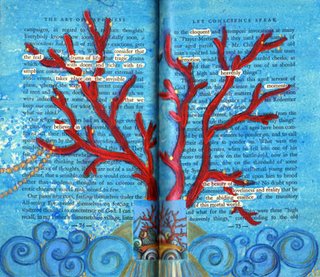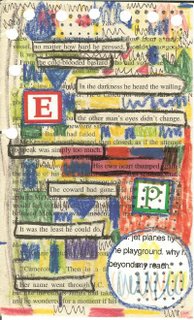Scratch (more) words. Make (more) art.
 This is how it goes: You crack open a door to discovery and find an even larger room aglow with delights.
This is how it goes: You crack open a door to discovery and find an even larger room aglow with delights.
And so, in my fascination for altered books, I found Karen Hatzigeorgiou, an artist creating contemporary art in the form of altered books and collage. To say her work is stunning is an understatement. It’s a wonderful balance of color and meaning, image and substance. I could sing her praises for paragraphs but I will direct you to the real thing instead: http://karenswhimsy.com.
I am especially inspired by The Art of Happiness. In the poet/artist’s hand, the 1935 book, of the same title, became a tool for emotional exploration. The result is a work-in-progress journal of touching color, collage and ‘found poetry.' (Page 18 is shown above).
“The Art of Happiness is sometimes a book of sadness, disillusionment, and discontent,” explains Karen. “Still, it's important to note that it is also a book with an underlying current of optimism. And in that way, it has become much more of an altered book journal than I ever intended.”
 Monday, October 6, 2008 at 12:06PM
Monday, October 6, 2008 at 12:06PM  Post a Comment |
Post a Comment | 

